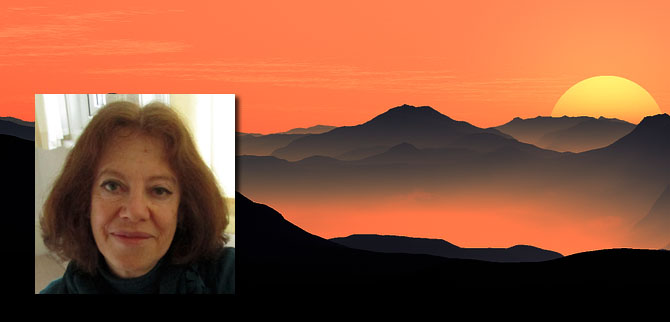Along the way, poems by Irene Kyffin
Irene came to the UK from Ireland in her 20’s. She began studying in her late 30’s, took a Degree in teaching Speech and Drama and went on to do a Masters in Social Anthropology. Irene has taught in Primary, Secondary and Further Education sectors. She has also lectured at University. Irene devised a programme, The Nature of Hopkins with the famous jazz pianist Stan Tracey. The poetry was read as jazz/poetry fusion. Stan and Irene presented the programme at many Literature Festivals in the UK. Irene has been writing papers on Hopkins and presenting them at conferences for a number of years. She has given these papers in the US, the UK, Ireland and Nepal. Irene has been working in Dyslexia for about fifteen years. In Further Education, she ran workshops for tutors. Since leaving, she has been giving public lectures in Dyslexia. Irene has been writing for a number of years.
Heat
The city trembles in the heat;
buildings agitate and exude
exhaustion. Seams that
hold the buildings intact
ache with tension;
the very mortar longs
for the cool of evening.
The Thames runs softly, offering
an invocation for a cool moment;
a hinge that holds the two sides
in their submission
to the grinding passage of the sun.
Antennae thresh the air
testing the solar compass –
the antennal clock has not reached
its moment; restrained by the sun exercising
its authority, the creature cannot take to
the migrating path: remains earth-bound.
At last, at last, the day begins its decline,
releasing, reluctantly, its captives.
Heat and energy achieve the balance flight demands;
we stir, the buildings stir and sigh – all is resolved.
in the darkening calm. The sun resigns its place;
gives way to the evening star.
After reading Dinah’s poem
Your words take me,
shake me and I realize
my experience in yours.
You make me focus on
a detail in the daily middle distance
of living.
Today this detail
launched itself at me,
eyes in the street
severed me from the comfortable
private habitation
of being.
A man looked at me
and his eyes told me, clearly
that I was denuded of clothes, of individuality
and of privacy;
that I was, above all,
for his consumption.
What I was, am, will be,
my sentient self, delights and
disappointments, disappeared
into the deep well
of his projection.
Some reflections on a
long history of women:
their mirror’d cornucopian
breasts and hips, Junoesque
beauty, consummate or otherwise
created by eyes such as those
that denuded me, expose, vividly,
the myth that sets the boundaries
of that look
To Your Specification
Let’s go home you said
And we can have tea
And you can write me a poem
On the computer.
Remembering that you don’t like
literary poems, I hesitate.
Can I write such a poem
At the command? it becomes
a threat – not a request, not a desire
to enter and share
my particular, peculiar world of words
which I know it is.
It has not been a poem afternoon.
It has been, right enough,
an afternoon of the rippled green of
the hills of
Clwyd – but it has been, too, a day
of searing wind,
the kind you struggle with, the kind
that makes you think about survival;
the kind that wipes out
any thoughts of poetry.
All you can do is catch your breath;
not with the beauty – you can forget that;
more with the staggering
uphill pull, on your
pounding heart, your lungs, your legs,
at the end of which you
say, bravely, that was exhilarating
and strangely, ironically,
mean it.
Generations
I know you
I know your face from ancient;
it has lived with me between the pages of the Book
and the letters of the Word;
it has been beside mine in the dragging of the stones
when we retrieved the sanctuary.
We fled to, held out and died at Masada,
staunch in our belief, choosing, preferring a paean to death
in a celebration of lives lived.
Whether we believe the world is eternal or
that it came into being on the cast of the die
is of no consequence;
we shared it in all its ambiguities.
We listened with one ear to the lachrymose violin of Bruch.
The glass broke and the shards of tears
scattered the pavements.
The musculature of the Enlightenment collapsed
in the wake of hope.
We carry on together;
Perhaps the Khazari melded into us
Or we into them but, inescapably,
we have become one.
Masada The Zealots fled to Masada in the 7thC to escape the Romans who laid siege. Rather than being captured, they committed mass suicide.
Khazari Beginning in the 8th century, the Khazar royalty and notable segments of the aristocracy converted to Judaism; the populace appears to have been a mosaic of pagan, Muslim, Jewish and Christian worshippers—and polyethnic. A modern theory, that the core of Ashkenazi Jewry emerged from a hypothetical Khazarian Jewish diaspora, is generally treated with scepticism.
A Memory
‘Do you want’, I say and bite my tongue
I hear my mother’s voice:
‘Would you like, dear’. It comes unhesitatingly.
The correction is always there, at my shoulder,
it will not let me go.
Just like the word ‘napkin’ which one should say
but not ‘serviette’.
I bravely think I’ve long dispensed with such gentilities
but, naggingly, the dispute still rages in my head.
Nowadays, foreigners say ‘napkin’ so that I am confused.
Every time my mouth opens to ask for – the thing, my speech –
along with my mind – freezes with the agony
of whether I should be saying
‘napkin’ or ‘serviette’.
Transformation
Between the first line and the last
The poem transforms the everyday
Making it strange;
Removes the particular experience
From its common context.
In this journey we recognise anew
What we already know
but now we have a new vocabulary
with which to express ourselves.
© Irene Kyffin


